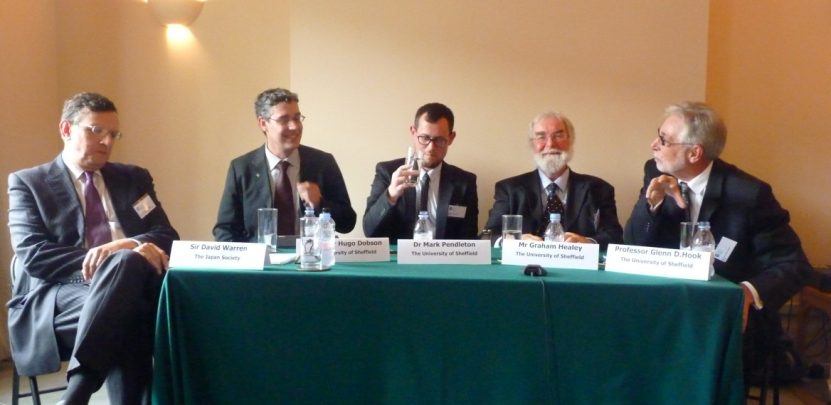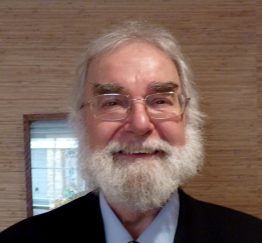 Seminar
SeminarThursday 3 October 2013
4:00pm – 6:00pm
Why Japanese Studies? Considering the Past, Present and Future
Drinks reception from 6:15pm
Daiwa Foundation Japan House, 13/14 Cornwall Terrace, Outer Circle, London NW1 4QP
Organised by The Daiwa Anglo-Japanese Foundation and the University of Sheffield
A roundtable in celebration of the Golden Jubilee of Japanese Studies at the University of Sheffield
This roundtable aimed to stimulate a discussion on Japanese Studies in the United Kingdom and the wider world in celebration of fifty years of Japanese Studies at the University of Sheffield. These five decades have witnessed a radical transformation in both Japan and in Japanese Studies. In 1962, just before the launch of the Centre for Japanese Studies at The University of Sheffield, The Economist called on the magazine’s readership to ‘Consider Japan’ and its remarkable economic growth. Yet, at the time, few experts combined the linguistic and area studies skills to be able do so. In the intervening years Japan has become of far greater significance for the UK as well as for an increasingly globalised world as Japanese Studies has flourished, with the field nowadays rich enough to ‘consider Japan’ in all its multifaceted complexity. The future poses challenges for both Japan and for the discipline. By reflecting on the past, present and future of Japan and Japanese Studies, the speakers will offer their own answers to the question, ‘Why Japanese Studies?’
You can view a recording of the event below:
About the contributors

Professor Hugo Dobson
Professor Hugo Dobson is Professor of Japan’s International Relations in the School of East Asian Studies and the National Institute of Japanese Studies at the University of Sheffield, UK. He was a Daiwa Scholar in 1993, undertaking work experience at Tokyo University and Aoyama Gakuin University and he gained his PhD from the University of Sheffield in 1998. His main research interests are the G8, G20 and global governance, Japan’s international relations, informal actors and the role of images in international relations. Publications include The Group of 7/8(Routledge, 2007), Japan’s International Relations: politics, economics, and security (Routledge, 2012, co-author), and Japan and the G7/8, 1975-2002(Routledge Curzon, 2004).

Graham Healey
Graham Healey read Chinese at the University of Oxford and in 1964 he went to Waseda University as a Monbusho Scholar to study Japanese language and literature. He joined the recently-established Centre for Japanese Studies at the University of Sheffield as a research student in 1966 and became a member of staff in 1967. At Sheffield, he has taught Japanese language, modern history and politics. He was instrumental in establishing Korean Studies at Sheffield from 1979 and, together with Alison Churchill, set up the Distance Learning Programme in 1995. He has been a visiting lecturer or research fellow at Kyoto, Hosei, Waseda and Hitotsubashi Universities. He is joint editor-in-chief and translator of two of the five volumes of The Iwakura Embassy 1871-1873, which won the Japan Society of Translators Prize for the best translation of 2002.

Dr Mark Pendleton
Dr Mark Pendleton is Lecturer in Japanese Studies at the University of Sheffield. A cultural and social historian by training, his research interests lie in modern and contemporary Japan, East Asian memory studies and transnational histories of gender and sexuality. He completed his PhD at the University of Melbourne in 2011; during this time he spent periods as a visiting research fellow at Tokyo University of Foreign Studies and New York University. He has published in academic journals including Japanese Studies andAsian Studies Review and has contributed book chapters on topics related to historical justice and memory, transnational sexual politics in East Asia and Japanese dark tourism. He joins the editorial committee of leading history journal History Workshop Journal in September.

Sir David Warren
Sir David Warren was British Ambassador to Japan from 2008 to 2012, after a career in the Diplomatic Service that focused on East Asian affairs, in which he served three times in the British Embassy in Tokyo (1977-1981; 1993-1998; 2008-2012), and as head of the China Hong Kong Department (1998-2000), as well as being a member of the team that set up the business promotion agency UK Trade and Investment from 2000 to 2004. He retired from the Diplomatic Service in January 2013, and is now pursuing a portfolio career in the public and private sectors. He has become a Visiting Professor at Sheffield and De Montfort Universities, and is also Chairman of the Japan Society.

Professor Glenn Hook (Chair)
Professor Glenn Hook (Chair) is Professor of Japanese Politics and International Relations, School of East Asian Studies, University of Sheffield and Director of the National Institute of Japanese Studies, part of the White Rose East Asia Centre, a collaboration with the University of Leeds. His research interests focus particularly on the role of Japan in East Asia, security and risk. His most recent publications include Japan’s International Relations: politics, economics and security (Routledge, 2012, third edition); Decoding Boundaries in Contemporary Japan: the Koizumi administration and beyond (Routledge, 2011, editor); Global Governance and Japan: the institutional architecture (Routledge, 2007, co-editor); and articles in Australian Journal of International Relations, Critical Asian Studies, Japan Forum andJournal of Japanese Studies.